30 October 2025
In the three decades Professor Graham Le Gros served as director of the Malaghan Institute, he brought together people to make a difference, uniting them under one goal: to bring life-changing, cutting-edge treatments to New Zealanders.

In December 1994, the Malaghan Institute, tucked away in the corner of Wellington Medical School, was made up of fewer than 10 people. With a range of disparate research projects, there was little that united these individuals other than being talented biomedical scientists who wanted to carry out high quality research.
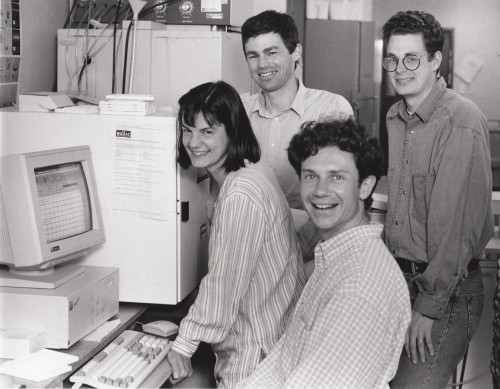
Clockwise from left - Franca Ronchese, Graham Le Gros, John Holloway, Rod Dunbar
This was about to change with the addition of two scientists who would breathe new life into the institute. New Zealander Graham and his Italian wife Professor Franca Ronchese were established immunologists who had been working in Basel, Switzerland. They had accepted an opportunity at a small New Zealand organisation which aimed to improve the health of New Zealanders through biomedical research.
As the new director of the Malaghan Institute, Graham was optimistic.
“There are always people who want to make a difference. It’s human nature. I recognised that we had to gather and unite these people under a common cause to make a positive impact,” he says. “With the right combination of people, technologies and focus on the medical sphere, we could tap into the groundswell of support from New Zealanders to try and improve the health of people through high quality research.”
As a seasoned immunologist, Graham saw the massive potential that lay in the field of immunology for improving health.
“The immune system is our body’s natural defence system that has evolved with us over billions of years. Its function is to protect us. It only makes sense that whatever health challenges we are facing today, from cancer to allergies, the solutions lie in understanding and working with this incredibly complex and adaptable system,” he says.
“There was a couple of years of testing the waters: building confidence in our commitment, our ability to recruit and attract promising, young scientists and to win grants from government and research organisations. In the meantime, we had to be resourceful, working on a shoestring budget to achieve research excellence.”
There are always people who want to make a difference. It’s human nature. I recognised that we had to gather and unite these people under a common cause to make a positive impact.
While Graham continued to lead pioneering research into allergic and parasitic disease, more scientists joined and research began to flourish, establishing the Malaghan as a world-class immunology research centre.
“Our vision was always to make a real difference for New Zealanders, so we started building the infrastructure needed for clinical trials,” says Graham.
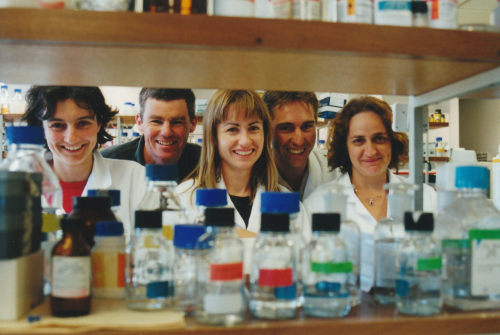
From left: Jacquie Harper, Graham Le Gros, Nicola Harris, Ben Marsland, Mali Camberis
At the time, the idea of using the immune system to fight cancer was dismissed by much of the scientific and medical community as fanciful. It had shown promise in mice, but there was little evidence it could work in people.
That changed in the 2010s when the first cancer immunotherapies were approved for clinical use overseas. These breakthroughs proved the concept, but they were beyond reach for most New Zealanders, locked behind patents, prohibitively expensive and requiring specialist expertise and infrastructure our health system lacked.
Determined to change this, the Malaghan launched New Zealand’s first CAR T-cell clinical trial in 2019. Graham saw it as a gateway not only to make these therapies available to New Zealanders, but to position the country at the forefront of innovation in cancer immunotherapy.
“The CAR T-cell trials felt like validation, proof that the faith of our donors and supporters over 20 years was not in vain. Together we are shifting attitudes in New Zealand science, building the expertise and infrastructure and laying the foundation for bringing world-leading immunotherapies home.”
For him, the most powerful moments were personal. “Meeting a patient on the CAR T trial who would otherwise not be here was indescribable. Knowing that multiple New Zealanders are alive today because of this work is profoundly gratifying and knowing that many more will benefit in the future is even more so.”
The advances in cancer immunotherapy were just one part of a bigger picture. The same expertise in harnessing the immune system became critical during the Covid-19 pandemic.
“During the Covid-19 pandemic I realised we had everything we needed to help New Zealand. We had the scientific knowledge, the international networks and the infrastructure to develop vaccines against infectious diseases. We had created an institution in New Zealand that was intellectually and technically capable of being a contender in the global endeavour to create a vaccine for this unknown disease.”
Uniting science, industry, government and philanthropy to build domestic vaccine capability, these efforts laid the groundwork for a national RNA development platform which has the potential to transform the treatment of disease.
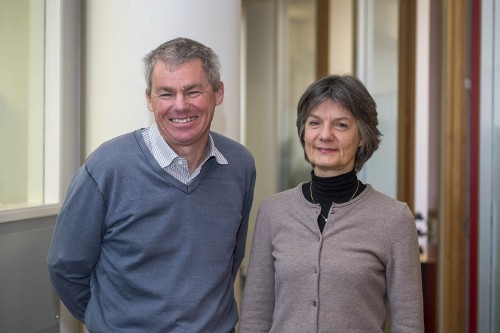
Graham and Franca
Today, the Malaghan Institute brings together more than 140 researchers and support staff, united in pushing the frontiers of biomedical science to prevent, treat and cure disease.
“The Malaghan Institute is the collective vision of scientists, funders and community supporters who want to improve health and save lives through research and innovation. From people giving five dollars to those giving five million, every contribution has helped build the network that makes this work possible.
“I’ve only set up the foundation. We have so much potential to achieve and I am certain that Professor Kjesten Wiig brings the right combination of scientific expertise, industry experience and powerful leadership to take the Malaghan to the next step. We will do this, fuelled by the knowledge that we have a responsibility to the New Zealand people.”
Professor Graham Le Gros stepped down as director of the Malaghan Institute on 31 December 2024. He continues to serve on the Trust Board as deputy chair.
Graham's top 5
Graham’s five proudest achievements for the Malaghan:
- Scientific and clinical discoveries that laid the foundations for bringing immune cell therapies to New Zealand for the successful treatment of cancer patients.
- Leading scientific discoveries of the cellular and hormonal mechanisms that determine how allergies start and give rise to asthma, food allergies and atopic disease.
- Discovering how to use parasitic worms to regulate the host immune system and treat pathogenic inflammatory diseases.
- The discovery that led to the paradigm shift in our understanding of how our cells can share and exchange mitochondria (their ‘power plants’), with implications for future therapies for controlling cancer cells and restoring degenerating tissues.
- Designing, developing and producing a novel Covid-19 protein vaccine in just two years and laying the foundations for mRNA vaccine technology in New Zealand.
Related articles
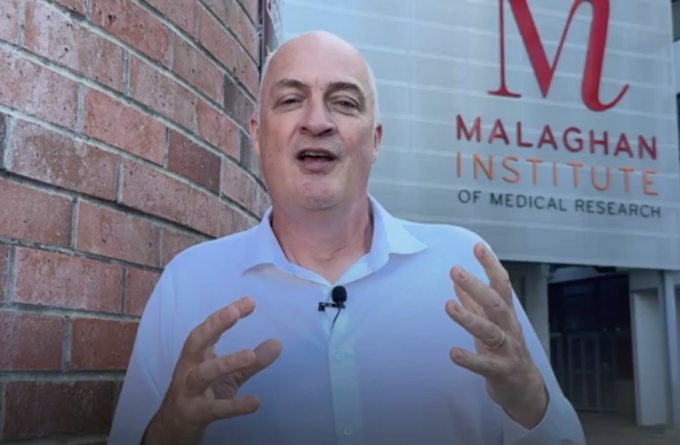
CAR T-cell therapy: 5-part video series
25 February 2026
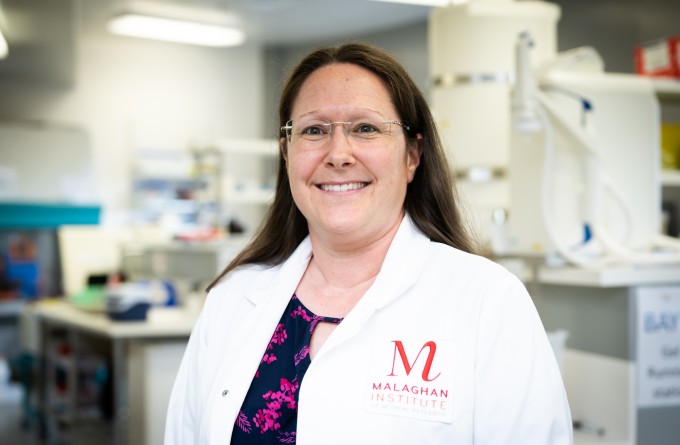
Momentum is everything: advancing CAR T-cell research for future trials and treatments
25 February 2026

A ground-breaking cancer treatment is within reach – but only if New Zealand acts now
12 February 2026
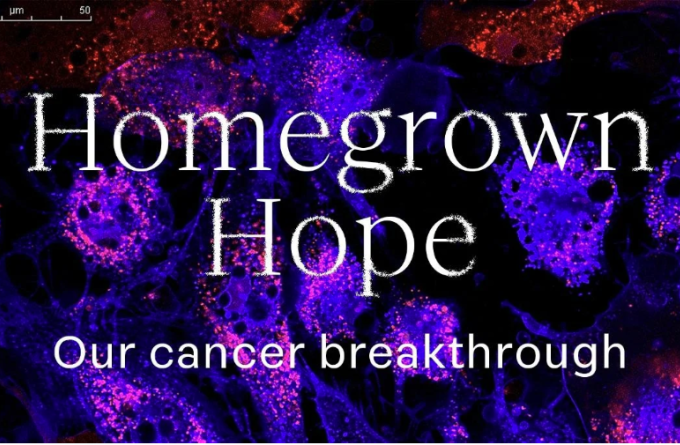
Homegrown Hope - Stuff's series on CAR T-cell therapy
11 February 2026

NZ-UK research deepens understanding of germinal centres for better vaccine design
27 January 2026
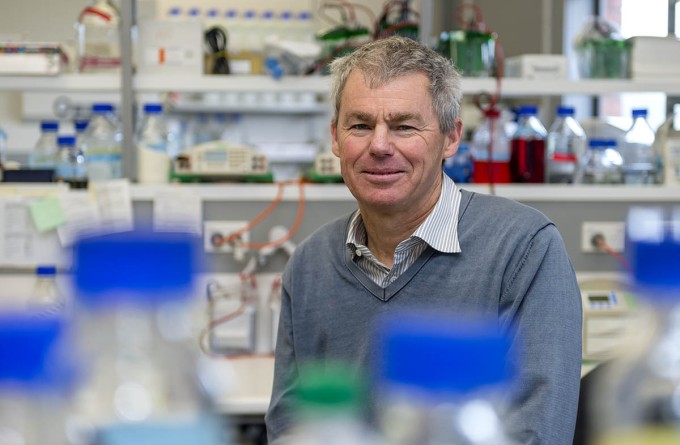
Sir Graham Le Gros awarded knighthood in New Year Honours
31 December 2025
